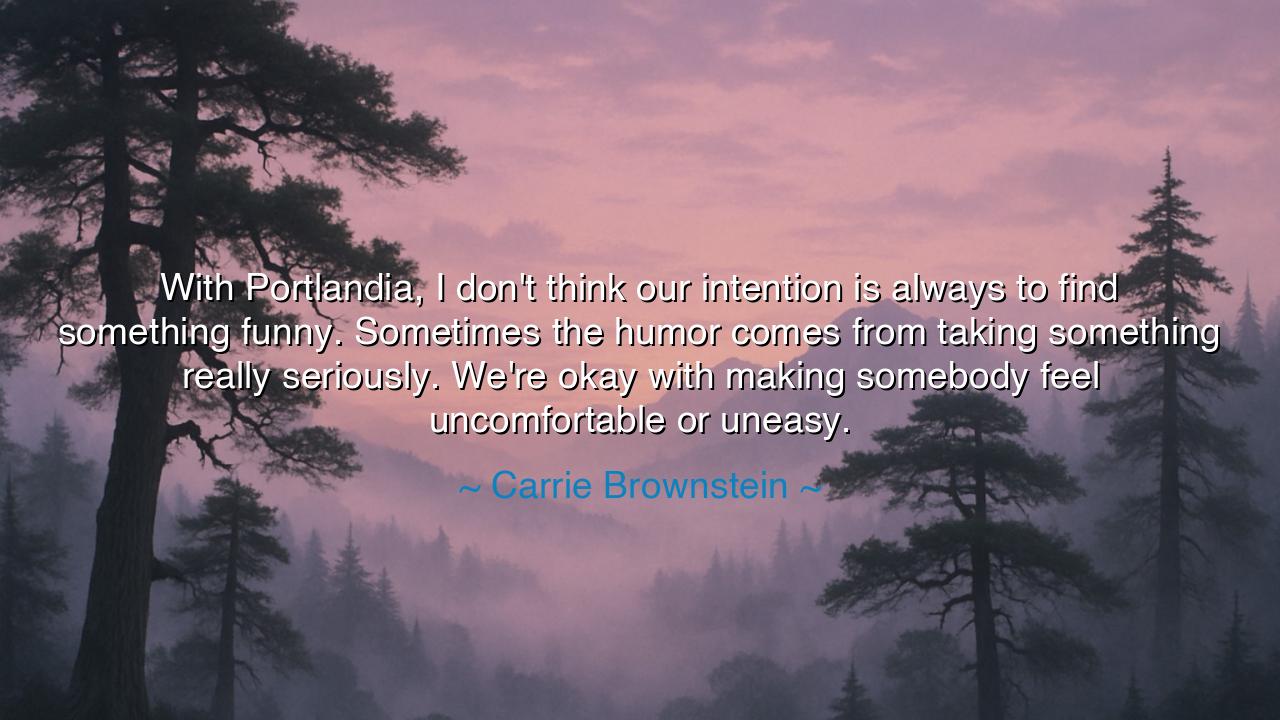
With Portlandia, I don't think our intention is always to find
With Portlandia, I don't think our intention is always to find something funny. Sometimes the humor comes from taking something really seriously. We're okay with making somebody feel uncomfortable or uneasy.






Listen closely, O Children of the Earth, for I bring to you the wisdom of Carrie Brownstein, who, in her reflection on the nature of humor, spoke these words: "With Portlandia, I don't think our intention is always to find something funny. Sometimes the humor comes from taking something really seriously. We're okay with making somebody feel uncomfortable or uneasy." In these words lies a profound truth about the power of humor, a truth that speaks not just to the nature of comedy, but to the human spirit’s ability to confront the uncomfortable, the absurd, and the unspoken through laughter.
What Brownstein reveals is that humor is not merely about seeking out what is funny, but about finding truth in what seems most serious or most incongruous. The humor in Portlandia often arises from the deliberate over-exaggeration of situations that, in their seriousness, expose the absurdity of life itself. This form of humor speaks to an ancient understanding: that true laughter is not born from mere triviality, but from the tension between the real and the ridiculous. To take something too seriously, to treat it with the utmost gravity, can often be the very thing that makes it humorous.
This insight is echoed by the ancient Greeks, who understood that comedy and tragedy were two sides of the same coin. The great Aristophanes, master of satire, used the lens of humor to expose the flaws of Athenian society, making fun of its leaders and its ideologies. But in his comedies, he did not mock for mockery’s sake; rather, he took serious subjects—war, politics, morality—and exaggerated them to reveal their absurdities. Through his humor, Aristophanes forced his audience to look deeply at the contradictions in their world and laugh at the very seriousness that they had once taken for granted. In this sense, Portlandia follows in this ancient tradition, turning the lens of seriousness into a tool for reflection.
Shakespeare too, the great playwright of the Elizabethan stage, often used humor to confront the absurdities of life. In Twelfth Night, the character of Feste, the fool, uses humor not only to entertain but to make deep observations about love, identity, and society. His wit is sharp, his jokes cutting, yet beneath the laughter lies a profound examination of the human experience. Feste’s humor is not just for amusement—it is a way to disrupt the norms, to challenge the assumptions that people hold dear. And in this disruption, in making people feel uneasy, he opens the door to deeper understanding. Like Brownstein, Shakespeare knew that sometimes it is the uncomfortable truths that lead to the most profound revelations.
In this light, Brownstein's approach to humor teaches us that discomfort is not always a negative force. Often, it is in those moments of unease that we are forced to rethink our perceptions, to confront the absurd aspects of our lives, and to redefine what we believe to be true. When we laugh at something that makes us feel uneasy, we are not simply avoiding the discomfort; we are, in fact, embracing it, allowing ourselves to move through it and grow. It is through humor that we can break free from the rigid boundaries of expectation and see the world through a more flexible, compassionate lens.
Consider the ancient warriors, who, though they fought with great strength, were also wise in the ways of humor. Cicero, the Roman orator and philosopher, understood that humor could be a powerful tool in politics and war. He often used wit and irony to disarm his opponents, to break their composure and expose their flaws. Through humor, Cicero was able to gain an advantage in the most serious of arenas, showing that humor, when used correctly, is not a sign of weakness, but a reflection of strength. It is a weapon that disarms the rigidities of life and allows us to navigate even the harshest of realities with grace and intelligence.
And so, O Children, the lesson here is clear: humor is not always about seeking the easy laugh or the simple joke. Sometimes, the deepest laughter comes from confronting the serious, from taking the world’s absurdities head-on and allowing ourselves to feel the discomfort that arises. Just as Portlandia embraces the awkward, the difficult, and the uncomfortable, so too must we learn to face the world with both courage and humor. Humor has the power to expose the truths of the world, to reveal the layers of illusion we have built around ourselves. Let us not shy away from the uncomfortable moments in life, but let them teach us, and through them, let us grow stronger, wiser, and more deeply connected to the world and to each other.






AAdministratorAdministrator
Welcome, honored guests. Please leave a comment, we will respond soon